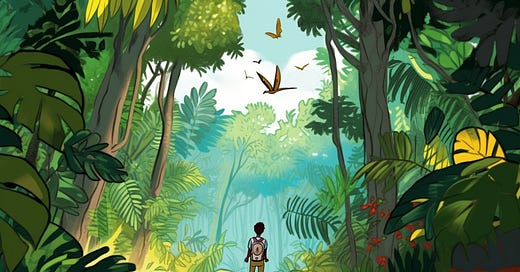Have a Great Climate Journey
The most effective way to transition to a climate career is to approach it with a mindset of helping others while having fun in the process
At the end of 2021 I got as close as I ever had to making a new years resolution: I was going to pursue a career in climate. At that point, I had spent years seeking joy and purpose at work, yet the idea of a radical pivot seemed impossible. I had traced a successful and interesting enough path in the first half of my career, and did not think to consider straying from a predictable and comfortable trajectory.
The Covid pandemic made me realize that I was not putting my skills to their best use. I have this thought experiment where I forward my career twenty-five years, imagining my older self evaluating how he spent his professional life. The truth I was confronted with is that I wasn’t doing all that I could to leave the world in a better state than I found it. With this insight, the only rational decision was to set out on an adventure to save the planet, as one does. Not that I had any idea where to begin, or what a career in climate would entail.
There are plenty of great resources out there to assist in changing industries, finding a job, or starting a business. Many are specific to climate, and I list some of them at the end of this post. Rather than writing yet another how-to-get-a-climate-job guide, I want to talk about making the journey itself a fulfilling one. The process is full of highs and lows, with a notable emphasis on the latter. However, when I began to direct my energy towards activities that brought me joy, I discovered that I was living through one of the most rewarding periods of my professional life.
Unless you’re like one of the few and intriguing individuals I’ve met throughout my journey, you’ll be lucky to make a career pivot once or twice in your lifetime. By any measure, it is a consequential, defining experience. You definitely want it to be successful, but you should also strive to make it fun.
It’s all too easy to fall into the usual pattern of perusing job boards, and endlessly tweaking cover letters and resumes to apply for as many roles as possible. That approach is a bit like throwing spaghetti at the wall to see what sticks, all the more frustrating when all you can see are Teflon-coated, squeaky clean walls.
Reflecting on my own journey, it is no coincidence that the most impactful actions I took in securing a climate job were also the most enjoyable. They were:
Connecting
Learning
Sharing
Paying it forward
Make meaningful connections
Networking gets a bad rap, and for good reason. Trying to lock eyes with a potential connection in a packed conference, or nervously approaching a group of strangers in conversation, can be an introvert’s nightmare scenario. The trivial small talk. The slim chances of forging a connection that might lead to a job opportunity. The sense of regret on the drive home, thinking: “those are two hours of my life I will never get back.” I get it, I’ve been there. It’s all too reminiscent of the awkward dating scene in my teens, which I’d sooner erase from memory.
That’s a form of networking I get little value from and rarely engage in. The aspects of network-building that I find most rewarding involve making meaningful connections, investing the time to genuinely get to know the other person, ideally in a quiet one-on-one setting.
The informational interview format works well here, even when connecting with others also transitioning into climate who can’t offer a ton of industry advice. Tell your story but also take the time to hear theirs, understanding where they are in their journey. Ask questions and, most importantly, offer support. Helping someone else on their journey leaves a positive impression and leads to stronger relationships. It can also make networking a rewarding project for yourself.
You might feel like there is little you can do to help, given you’re the one seeking advice, a referral, or a job. But there are several ways to add value, provided you do a bit of research about your new connection and listen to what they are saying. You have a professional network yourself, and might know someone they’d like to connect with. You might have insights to share about your own expertise, especially if relevant to a challenge you picked up on during the conversation. You could provide feedback about one of their recent blog or social media posts (people are always delighted to hear how much their content has resonated with others.) Or you could simply share an article or podcast they might find interesting. You get the idea.
Cultivating relationships throughout the journey is crucial because it helps to talk to others who are going through their own rollercoaster ride. This is especially true if you have a climate transition buddy. You can each pull the other forward, share tips and interesting opportunities, rant about how that dream job fell through after the nth interview, or how you never heard back after crafting that perfect application. Make enough meaningful connections, and at the end you’ll have a group to celebrate with.
Learn about climate, and about yourself
I was fortunate enough to have been laid off (an odd thing to say, but it’s true) just as I was embarking on my climate journey. This gave me a few months to figure out my next steps. I ultimately decided that the most effective use of that time would be to dedicate it to learning. This turned out to be what most improved my chances of launching a climate career.
I dedicated a big part of my days to reading articles, reading books, asking in-depth questions, listening and re-listening to podcasts, sometimes becoming so obsessed that I would follow the internet rabbit hole into the wee hours of the morning, going as deep as I could into a topic. I fully appreciate that not everyone has the financial cushion or spare time that I had, but even a little bit of learning can go a long way for those new to the field, especially if you focus on what interests you most.
This extensive, often deep dive into my climate education had two main effects. First, it helped me discover what sector I was most interested in, which concentrated my efforts. More significantly, it bolstered my confidence to form my own perspectives on climate solutions. I highly recommend this to anyone wanting to avoid getting swept up in the groupthink that is not uncommon in this space. Such a wide range of solutions within a sector that is still taking shape means that different camps often have opposing views: Energy abundance? Degrowth? 100% renewables? Nuclear power? Is there a role for natural gas? Do heat pumps work in cold weather? Is hydrogen the solution to everything? Should geoengineering be on the cards? Is levelized cost of energy a good metric? (for the record: yes, no way, not feasible, yes, yes, yes, no, probably, it’s complicated)
Throughout this journey, I also learned a great deal about myself and my life priorities. I had time to gain the clarity I needed about the type of of organization, team, culture, and mission I was seeking. All this gave me an “I’ll know it when I see it” level of confidence when it was time to decide on my next challenge.
Share your content
Early on in my search, someone advised me that while I couldn’t demonstrate prior climate experience (I had none), I could at least show that I was passionate about the field and motivated to learn: I just had to write about it.
I avoided that piece of advice for as long as I could, rationalizing it each time with a fresh excuse: there’s so much great content out there already, why would anyone care about my views, I don’t have anything interesting to say, it will suck, I’ll get something wrong and it will haunt me forever. I was terrified of putting myself out there.
But the more you learn about yourself, the more you excel at tricking yourself into action. I concluded that writing about climate would make enough of a difference to breaking into the space that I simply had to do it. I reasoned that since I was already investing so much time in learning, I might as well write about it. I could start a virtuous cycle where forcing myself to write would in turn compel me to learn more. Plus, I would write for my own benefit only, so it wouldn’t bother me if no one else cared.
Once I got going, however, writing became an exciting project. It kept me engaged with gratifying work that turned out to be invaluable in my search. Writing gave me confidence to speak intelligently about climate topics, with the authority of someone who has done the research and knows what they’re talking about. I also gained greater clarity about what I didn’t know, and could use that to guide the conversations that helped me make more meaningful connections.
Writing takes a lot of work and it won’t suit everyone. Nonetheless, I do believe that publishing some form of content is crucial in developing a personal brand that makes a good impression when others look you up. Whether it’s short-form or in-depth articles, social media posts, or even a podcast: find what works best for you, and you will find your voice.
This Substack started as a temporary experiment to help me find a job, and it has morphed into a project that is now core to a personal mission. Today, my primary motivation for writing is to attract more talent to climate. I hope that my musings will help those undergoing a similar journey stay motivated, and also spark interest in the minds of the climate-curious who might need an extra nudge to take the plunge into this field.
Plus, it’s great fun.
Pay it forward
The first thing I noticed when I ventured into the climate scene was how generous everyone is with their time. In the right communities, a cold DM will likely receive a response and might even lead to an introductory meeting. Slack channels brim with collaboration, startup ideas, hiring, and regular contributions by experts. There are career transition meetups, regular job fairs, and #OpenDoorClimate initiatives. Much of this relies on people who are volunteering their time.
I owe a lot to dozens of people I met over the past year who supported me, shared a bit of advice, made a warm intro, or just took the time to listen. Some of them may not even realize they were helpful, sadly I wasn’t as disciplined as I should have been with thank-you notes. Now, I am inspired to help by sharing what I wish I had known when I started down this path.
Another reason to pay it forward is climate impact. Many try to maximize impact by focusing on solutions that reduce the most greenhouse gas emissions, but the way to have the most impact is to simply work anywhere in the sector. Likewise, few pursuits are more impactful than attracting more talent into climate. We need 1 million people globally with the skills for climate work this decade. I believe there is an enormous amount of talent ready to contribute but uncertain how to, or unaware they want to yet. In my own way, I think I can plant a seed in some of those minds to help create that groundswell.
One of the most gratifying moments I had in this past year happened during an introductory Zoom call with someone, let’s call him Joe, who was considering a career in climate. At one point, Joe held up his phone so I could see a WhatsApp conversation where his friend, someone I am not connected with and had never heard of, had shared with Joe a link to my post on repurposing a career, along with a remark “this is what inspired me to get into climate.”
Journey vs. Destination
Most people embark on a climate journey because of something that matters deeply to them. A cure to climate anxiety. Coral reefs. The Amazon. One’s children or grandchildren. Cheap and abundant energy. Environmental justice. Cool tech. Clean air. A prosperous and long future for a space-faring civilization. The list goes on. Whatever your motivation, you are looking for purpose and joy in what you do during working hours.
There are countless other things that can bring joy during this journey beyond finding paid work. For me, they were: meditation, picking up a trashy sci-fi novel, gardening, hikes with my dog, catching up with good friends. These are all ways to process what you’re going through and to deepen the self discovery.
Breaking into a new sector can be daunting, and it is disheartening when things are not working out. Right now is an especially tough time to be a job seeker, as the market is saturated with top talent following big tech layoffs. It’s important not to get discouraged. A foundation of relationship building and content creation will yield the best results in the long run, even if it doesn’t feel like the best use of time when you’re in the middle of it. Keep at it, and make it work for you as well as for others. A surefire way of maintaining motivation, while at the same time maximizing your chances of success, is to find joy in the process.
Resources I found helpful
During the past year or so I’ve compiled all the resources that were useful to me (with help from Ben Lai — thanks Ben!) Check out the Google Doc for the complete list. Here are my top resources:
My Climate Journey is the most engaging and easiest community for making valuable connections.
Terra.do’s Learning For Action fellowship was well worth the investment
Bill Gates’ How To Avoid a Climate Disaster is a great book to get started.
Climate Tech VC newsletter for startup funding deals.
Climate Town comedy videos are a riot.
Other Substacks:
People I follow:
David Wallace-Wells writes a newsletter for the New York Times and is prolific on Twitter
Zeke Hausfather and CarbonBrief for accessible climate science
The Breakthrough Institute, an ecomodernist think-tank
Robinson Meyer for great takes at the intersection of climate and politics
If you are a software engineer, and especially if you’ve been laid off, my friend Steven Zhang has sage advice for landing a job at a top climate tech startup.














André, I just re-read this again, having saved the tab in my browser for the past few weeks. I love this piece and want to thank you for sharing this with all of us. I recognize so many parts of your journey and hope that others find inspiration in your words, your vulnerability and your passion. You continue to inspire!
This resonates with me on such a deep level. I couldn't agree more with everything written. Glad to have met through a chat and hope to stay in touch for many years to come.